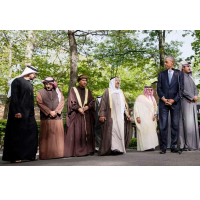Obama Promises U.S. Military will Defend Rich Arab Dictatorships
 President Obama with Gulf Arab Leaders (photo: Pete Souza, White House)
President Obama with Gulf Arab Leaders (photo: Pete Souza, White House)
High officials from six Persian Gulf countries got assurances last week from President Barack Obama at a meeting of the Cooperation Council for the Arab States of the Gulf (GCC) that the United States would respond, perhaps with military force, to an “external threat” to any of the countries.
The six countries represented at the meeting, Saudi Arabia; Kuwait; Bahrain; Qatar; Oman; and the United Arab Emirates, seem to have no problems dealing with what they perceive as internal threats, however. Amnesty International has cataloged human rights abuses in each of those countries:
- In Saudi Arabia, “torture of detainees was reportedly common; courts convicted defendants on the basis of torture-tainted “confessions” and sentenced others to flogging.”
- In Kuwait, “authorities used a telecommunications law to prosecute and imprison critics who expressed dissent using social media, and curtailed the right to public assembly.”
- In Bahrain, “security forces used excessive force to disperse protests, killing at least two people. Opposition activists sentenced after unfair trials in previous years continued to be held, including prisoners of conscience. Torture of detainees continued and a climate of impunity prevailed.”
- In Qatar, “migrant workers remained inadequately protected under the law and were exploited and abused. Women faced discrimination and violence. The authorities restricted freedom of expression and courts failed to uphold fair trial standards.”
- In Oman, “state authorities continued to restrict freedom of expression, including in the media and online. Freedom of assembly was not permitted. Several government critics were detained and held incommunicado for some weeks.”
- In the United Arab Emirates, “the government restricted the rights to freedom of expression and association, and prosecuted critics using provisions of the Penal Code and the 2012 cybercrimes law. Prisoners of conscience continued to be held after unfair trials in which courts accepted evidence allegedly obtained through torture and other violations of their rights.”
The meeting at the Camp David presidential retreat about security issues affecting those nations was supposed to include the leaders of all the countries, but only the leaders of Kuwait and Qatar attended with the four other countries sending surrogates. The Omani and UAE leaders have health problems and the leader of Bahrain opted instead to attend a horse show with Britain’s Queen Elizabeth. The Saudi leader was scheduled to come, but in a last-minute snub over U.S. cooperation with Iran on nuclear issues, sent a defense minister instead.
All the Gulf nations are concerned with the threat Iran poses and Obama assured their representatives that sanctions against that country would not be lifted until it’s clear Iran will hold up its end of the agreement to end its nuclear weapons program.
-Steve Straehley
To Learn More:
Obama Commits U.S. to Defend Gulf Arab Allies’ Territory (by S.V. Date, National Journal)
DC’s Dictator Summit (by Medea Benjamin and Nalini Ramachandran, Foreign Policy in Focus)
Gulf Cooperation Council Summit (video) (C-SPAN)
Obama and Kerry Ally U.S. with 8 Arab Dictators to Combat ISIS (by Noel Brinkerhoff, AllGov)
- Top Stories
- Unusual News
- Where is the Money Going?
- Controversies
- U.S. and the World
- Appointments and Resignations
- Latest News
- Musk and Trump Fire Members of Congress
- Trump Calls for Violent Street Demonstrations Against Himself
- Trump Changes Name of Republican Party
- The 2024 Election By the Numbers
- Bashar al-Assad—The Fall of a Rabid AntiSemite






Comments